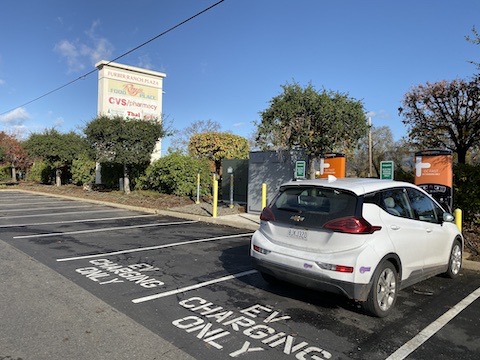
One of the excuses I used to justify purchasing the Chevy Bolt was the cost of fuel. Last year I spent something on the order of $2000 on gasoline, even with absurdly low American gasoline prices (~$3.33/gallon). True, I got around 18,000 miles out of that gasoline, but that’s still a substantial sum, all the more so considering who it is that’s actually profiting from the transaction. EV driving, I estimated, would be cheaper.
Turns out for once I was generally correct.
The great thing about EVs is they can be charged almost anywhere that there is a power outlet. True, there are dedicated charging networks which are necessary for making long trips without spending huge amounts of time, but for the most part, if your home or office has a power outlet, you’re set.
The Bolt’s battery is 60kWh. Charging is pretty efficient (90% or so), so to fill from empty, you need typically ~66kWh of actual energy from the grid. The average price for residential electricity in the US is $0.12/kWh, which means that in theory you should be able to ‘fill’ your battery for the princely sum of… $8. And with that, you can travel 240 miles.
Compared to a gasoline vehicle, this is pretty cheap. The ultra-efficient 2020 Toyota Prius claims to get 55 miles/gallon, which means at $3.33/gallon you’re paying ~$14.50 to go the same distance. Most vehicles are far less efficient than that. My previous car for example got closer to 30 miles/gallon, for a cost of $26.60 for 240 miles.
There is (as always) a caveat. Electricity prices vary widely. Here in northern California, our electric utility PG&E has a special plan for EV owners. Charge between 11PM and 7AM and you pay $0.16/kWh. Charge any other time, or on any other plan, and you pay a lot more. Up to $0.48/kWh in some cases. So your mileage (cost) may vary.
What about commercial charging stations? They vary in price as well. The town where I live has many Level 2 (240V AC) stations that cost merely $1/hour, or roughly $0.14/kWh which is pretty good. But I’ve seen others anywhere from $1-$4/hour.
For long trips though, one tends to rely on DC Fast Chargers. These charge at much faster rates, but also cost significantly more. They also meter by time, not energy, and due to the Bolt’s nonlinear charging behavior on faster chargers means the price/kWh grows considerably once the vehicle gets beyond 50% charge.
The least expensive DCFC network is Electrify America, which with a $4/mo membership costs $0.18/min, equating to $0.20/kWh under optimal conditions (77-104F battery temp, <55% charged) and $0.27/kWh under more typical ones (68-77F battery temp or 55-65% charged). EvGo, the other major network is $0.24/min which translates to $0.26 or $0.38 per kWh respectively. This more than twice the cost of the lower-priced L2 chargers. ChargePoint costs vary much more widely but $0.25/kWh + $0.10/min are not uncommon, making for $0.38/kWh or $0.50/kWh. With DCFCs you are paying for convenience.
Yet another wrinkle is that some employers offer subsidized or free electric charging, due to government incentives and the relatively lower cost of commercial electricity (vs. residential).
So where does that leave things? Well, this past year I covered 23,000 miles in the Bolt, and logged just under $500 in electricity charges, for an overall cost of $0.08/kWh (or $5.20 per ‘tank’). My office has 3 free electric chargers, and more than half of those miles were use electricity charged at work. I did a small amount of charging at home ($0.22-$0.32/kWh depending on the season). I also did some charging at DCFCs during long trips (mainly EvGo, some ElectrifyAmerica too though) which accounted for most of the cost, but only around 20% of the miles.
